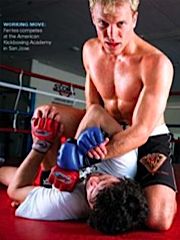
So, I'm a fan, and I believe in his program - I've seen for myself that at least part of it works. But at the same time, I find myself questioning the whole premise of his project (I'm like that scorpion - it's in my nature). Should we, as the tagline for the new book puts it, be interested in "becoming superhuman"? Achievement, excellence, and overcoming are the foundations of Ferriss' empire, in a very concrete sense - his financial success was initially built on selling vitamins, which (true or not) promise miraculous personal advancement. His first book, "The 4-Hour Workweek
In my own work and life, I constantly encounter people for whom this model simply doesn't hold. Musicians, writers, artists, and activists have measures of success that don't map to how much you can deadlift or how much money you make. Last week I talked with DJ Muta, the producer and turntablist for the group Juswanna, and he couldn't have been more explicit: "If your aim as a musician is just to make a living off your music, you're setting your sights too low. I make music so I can help people, give them the inspiration to go out there and make it through their struggles. That's the top of the mountain. Money is only halfway up the mountain." We were talking about this while sitting in the closet-sized space of his studio, which is actually the 'living room' of his tiny apartment in western Tokyo. Muta, despite something that's probably closer to a 70-hour workweek, seems like a pretty happy guy.
But he wouldn't be considered a 'success' by Ferriss' standards, which, though they often remain implied, are only slight modifications on the Anthony Robbins "achieving greatness" vibe. Though Ferriss clearly has a (narrow) creative streak, and a hunger for new experiences, what he doesn't seem to have much of is capacity for or interest in reflection, either on himself or on society. Most obviously, he has no apparent use for art or culture. More subtly, his entire approach to life - scheduled and strategized to the nth degree - leaves no room for real leisure, aimless laziness, even boredom, all of which actually leave the space for new things to emerge.
"achieving greatness" vibe. Though Ferriss clearly has a (narrow) creative streak, and a hunger for new experiences, what he doesn't seem to have much of is capacity for or interest in reflection, either on himself or on society. Most obviously, he has no apparent use for art or culture. More subtly, his entire approach to life - scheduled and strategized to the nth degree - leaves no room for real leisure, aimless laziness, even boredom, all of which actually leave the space for new things to emerge.
It's not surprising, then, that Ferriss' books are both bestsellers - he appeals directly to the way our culture already works, to the values of the ruling class, basically defined by the desire to both live a materially rich life (iPad in one hand, four-dollar latte in the other), and also to be "fulfilled," whether that means climbing mountains or doing aikido in your free time. This "fulfillment" is rarely associated with, say, writing poetry or other creative pursuits, but instead by more quantifiable achievements - a fact Ferris has capitalized on, quantifying everything from his world-record in Tango to, in The 4-Hour Body, his utilitarian, mechanistic guide to the sex.
Now, like I said, I've drunk the kool-aid on much of this. There's a part of my brain that's very competitive, and I take pride in all of my accomplishments. Particularly, I'm proud my current situation, which, while temporary, is a version of Ferriss' own globe-trotting lifestyle, earned by doing what I love (you can see even there how much I, like Ferriss, love not-so-subtly touting my own achievements). Every success I have gives me a little jolt of endorphins - but as I get older, I've started to register just how quickly those doses wear off and every "achievement" begins to look like the new normal. It takes something far more profound and deep than success to get to that most elusive achievement of all - happiness. From reading Ferriss' book and seeing how he presents himself, he seems like a genuinely happy guy, and I'm sure that has fueled his success.
But I wonder what the relationship is between Ferriss' relentless achievement-orientation and his apparently genuine happiness. In The 4-Hour Body, he explicitly lays out his belief that achievement leads to confidence and from there, to happiness. But as others have pointed out, "achievement" can also become a framework for hilarious and pathetic self-delusion, and a distraction from the real substance of life. I can't yet say I'm practicing this - I pulled a ten-hour workday yesterday, followed by yoga - but even as I pursue some of the tips Ferriss provides in 4HB, I also want to recommitt to indolence, to aimlessness, to self-abandonment. I think they might be where the real joys of life lie.
No comments:
Post a Comment